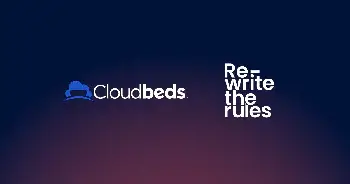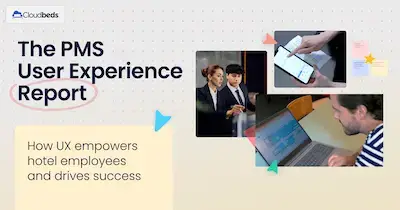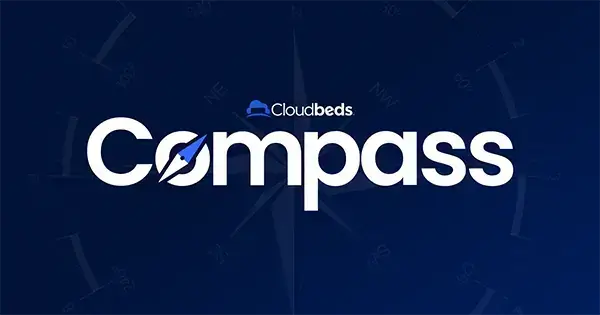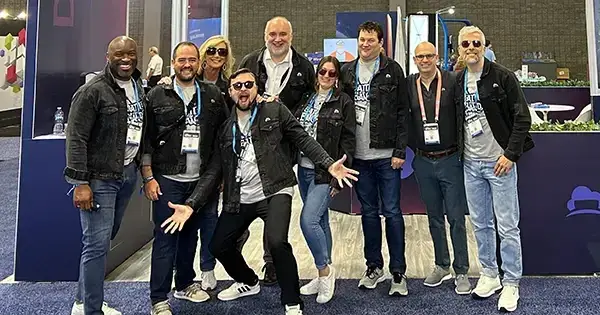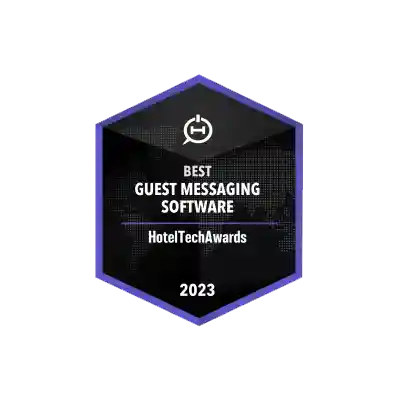
By Cloudbeds
As a hotelier, a property management system (PMS) is one of your greatest assets. A good PMS streamlines everyday hotel workflows and increases efficiency and, ultimately, profitability. On the other hand, a second-hand PMS can make life very difficult, from mishandling reservations and front desk operations to housekeeping and maintenance management.
This article breaks down the core functionalities to look for in modern PMS software, the advantages they bring to hotel businesses, and top solutions. But first, what is a hotel PMS exactly?
What is a hotel property management system?
A property management system (PMS) is software used in hospitality to control, organize, and execute operations and day-to-day activities of a hotel, hostel, B&B, inn, or vacation rental property.
Think of a PMS system as back-office software hospitality staff use to perform daily operations like managing reservations, check-ins/checkouts, guest information and guest services pre and post-stay, housekeeping, availability, pricing, channel connections, reporting and analytics, and much more.
Listen to a clip from The Turndown to hear Jennifer Barnwell, President at Curator Hotel & Resort Collection, discuss what types of property management systems she sees hotels adopting today.
10 functions of a PMS
1. Control dashboard
An intuitive, interactive, and easy-to-use dashboard should greet you when you log in and open your property management system. An easily digestible control dashboard provides an instant snapshot of the most critical information for your daily tasks. With real-time insights, you can complete tasks faster, leaving you more time to prepare for and greet guests.
Information about room inventory, occupancy rates, arrivals, and departures will likely influence other decisions, such as the daily rate and yield management. This info must be right at your fingertips in a clean and user-friendly interface, especially for front desk staff. Hotel managers and owners want to know the most important information up front, and a dashboard is incredibly helpful.
2. Channel management
You also want to distribute your inventory across online distribution channels and sync information from and to your PMS in real-time. A channel manager enhances your online visibility and generates more reservations and profit. It must be integrated with your property management software for complete control and no risk of overbookings.
Whether you need to release availability or make rate changes, you can do everything in your PMS and have it automatically updated across booking channels. New online reservations get delivered to your PMS, so you’re always in full control of your occupancy and can take immediate action if needed. Look for a channel manager with robust two-way connections to leading online travel agents (OTAs) like Expedia and Airbnb, GDS providers, metasearch sites, and more.
3. Calendar
A calendar is a great way to visualize reservations. With an easy-to-read calendar, you can see room availability and unlock optimization possibilities. If you view your reservations in an Excel spreadsheet, you might not see a hidden availability.
For example, say a guest is booked for a standard room for three nights, and that same room was unbooked the night before. Now, you know your guests almost always book a minimum two-night trip. You also see availability in your suite for three nights. If you release the original regular room reservation, you can see not one but maybe two more reservations. Your one-night stay loss just turned into two more bookings, and you upgraded a current booking. It doesn’t always work this way, but a calendar will help you and your front office see instances where guests can be moved to optimize occupancy.
4. Housekeeping management
Housekeeping functionality will help keep properties of all sizes running smoothly. Your hotel PMS should automate administrative tasks and create more efficient systems. A housekeeping report falls into this category. Your PMS provider should know which rooms need to be tidied or thoroughly cleaned for an arriving guest.
The Cloudbeds PMS allows you to assign employees to clean certain rooms. You can print this report and give it to your housekeepers. Then, once they’ve finished, you can update room statuses, making guest check-ins a breeze.
5. Revenue management
Streamline your rate management with revenue management functionality, especially if you don’t have a dedicated revenue manager. Today’s revenue management technology can help you optimize your pricing plans for both profit and occupancy and take the guesswork out of hotel performance metrics such as ADR (average daily rate), RevPAR (revenue per available room), and more.
By monitoring competitors’ pricing, gathering market data in real-time, and updating pricing automatically, a revenue management system (RMS) helps you implement a dynamic pricing strategy. For better efficiency and data accuracy, choose a hotel PMS that is integrated with a revenue management system.
6. Payment processing
An integrated payment processor will help you streamline guest payments, invoicing, and accounting, as well as help keep more accurate reports. If a PMS does not have a payment processor and payment gateway that accepts most credit cards or integration to a point of sale system (POS), you will have to manually handle payments and all related tasks such as reporting, reconciliations, chargebacks, and more. And as you know, manual input greatly increases the likelihood of errors.
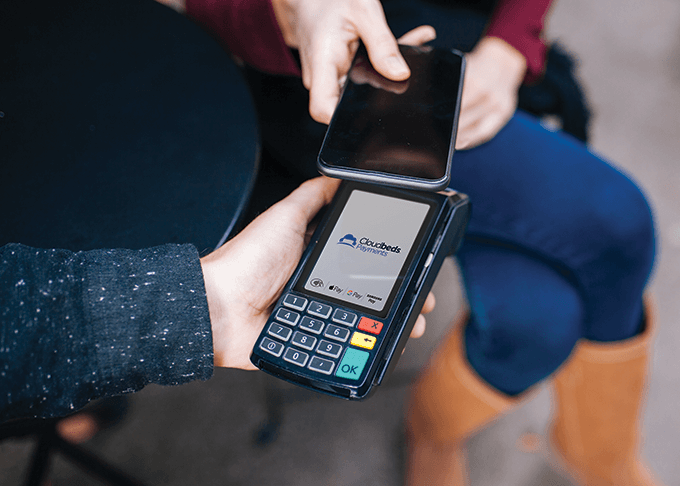
7. Reporting
Reports are one of the core components of a property management system. Needless to say, reports and data are the best way to take your property to the next level. Your property management system should have built-in reporting functionalities.
Your PMS already houses your reservations, rates, and occupancy, so let it do the work for you. Knowing the stats should be the easy part and will facilitate an easier analysis. With a cloud PMS, you can access your reports from anywhere and take action when your business needs it the most.
8. Online booking engine
Choose a PMS software with a commission-free booking engine. Direct bookings are among the most valuable sources of revenue for most properties. You shouldn’t have to pay to get bookings you worked hard for. When a PMS comes with a booking engine, you do not have to worry about integration problems. Look for a booking engine to integrate with your website and social media, making sure it is fast-loading and user-friendly, especially on mobile devices.
9. Guest management
Choose software with guest engagement tools to save yourself a lot of time and gain efficiency. Essential features to look for are guest profiles, which work like a CRM to store your guest data, and guest engagement.
Guest communication is a time-consuming process that greatly impacts guest experience and guest satisfaction. To automate this process, provide high-quality customer experiences, and generate ancillary revenue from upgrades and other services, look for a solution with messaging functionality and upsell capabilities.
10. Marketplace or open API
If you need extra tools to complement your PMS technology, look for a solution with integrated 3rd party solutions. This marketplace model allows you to choose the tech stack that will work best for your property’s specific needs. From contactless check-in services like self-service kiosks and smart locks to online reputation management services, central reservation systems, and police reporting.
You can also build your own tools or mobile apps that can be synced with your hotel PMS via API. To do so, look for a provider with a well-documented and supported open API.
Hotel property management software comparison
Cloud-based vs. on-premise
When researching property management solutions, look for cloud-based technology that is accessible from anywhere. This will help you log in to manage your business operations regardless of location. Furthermore, compared with on-premise software, web-based technology is more straightforward when installing updates and improvements.
One platform vs. disparate systems
To compete in the complex world of reservation management, you need access to other core systems besides the PMS. This includes your website booking engine, channel manager, revenue management system, and payment processor. If your PMS provider builds these tools in-house and connects them seamlessly, you’ll avoid having to deal with too many vendors, support teams, pricing plans, and more.
Commission-based vs. fixed fee pricing
PMS solutions nowadays work on a commission-based model on the reservations you receive or on a fixed monthly fee that depends on the property type and modules you’ll be using.
24/7 support vs. ticketing system
Take a close look at the customer support offered by the PMS provider: whether there’s a ticketing system with limited availability after hours or 24/7/365 support from a team of in-house specialists. Furthermore, factor in the time and cost of implementing new software. Ask what the process looks like, how data is transferred and what kind of assistance is available during this process and after.
Top 10 PMS systems in 2025
The following property management systems offer the features mentioned above and much more:
Cloudbeds
The Cloudbeds platform is built with all the tools you need to run and grow your business so you can focus on the guest experience. The cloud-based hospitality management platform is revolutionizing the hospitality industry with a suite of unified tools that include a PMS, channel manager, booking engine, revenue management tool, payment processing with integrated terminals, guest engagement solution, digital marketing services, and marketplace of third-party apps.
ClockPMS
Clock Software offers an integrated suite of cloud-based hotel management software solutions, distribution systems, and guest engagement apps, including a PMS, POS system, mobile check-in, sales software, and a meetings & events solution.
Eviivo
With seven headquarters across the globe, Eviivo Suite is an integrated property management system featuring an online booking engine, channel manager, guest manager, performance manager, and numerous other features.
Frontdesk Anywhere
Frontdesk Anywhere’s cloud-based hotel management software is designed to reduce costs, streamline operations, and increase revenue. Solutions include a PMS, booking engine, channel manager, payment system, and revenue management system.
Hotelogix
Headquartered in Singapore, Hotelogix is cloud-based PMS designed to simplify hotel operations featuring a web booking engine, channel manager, and an app that works from your mobile device.
LittleHotelier
LittleHotelier’s hotel management software is built especially for small properties, offering an array of solutions that include a PMS, mobile app, booking engine, and channel manager, as well as an app store offering third-party integrations.
Mews
Headquartered in Amsterdam, Mews is a cloud-based software company offering a suite of fully integrated products, including a PMS, booking engine, RMS, and payment system, as well as a marketplace of over 600 third-party apps and integrations.
Oracle OPERA
OPERA 5 property management solutions allow hoteliers to orchestrate the many facets of their business—including reservations, loyalty, and sales and catering—to elevate guest service and increase profitability.
ResNexus
Based in Utah, ResNexus is a cloud-based property management system that offers a number of products, including a reservation system, payment processing, and web booking engine, as well as marketing services and integrations with third-party vendors.
RMS Hospitality
Headquartered in San Diego, RMS Hospitality is a fully integrated, cloud-based reservation and property management system offering a hotel booking engine, channel manager, RMS, and more than 100 third-party integrations.
RoomRaccoon
Toronto-based RoomRaccoon is a cloud-based hotel management system built for independent properties, featuring a PMS, online check-in, accounting automation, and an upsell solution, as well as integrations with a variety of third-party apps.
Final thoughts
A PMS software is the platform you will use day in and day out to increase operational efficiency your hotel, hostel, B&B, motel, or alternative accommodation. Depending on your business size, operational needs, and budget, choosing an all-in-one property management system with the right suite of components is critical to running your property efficiently.
Don’t forget to check for reviews from hoteliers on Google, hotel industry review sites, and software review sites such as Capterra, TrustPilot, SoftwareAdvice, and more. Look for technology that is integrated, user-friendly for your hotel staff, and comprehensive in functionality for every user.

